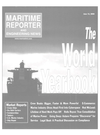
Shipbuilders Discuss Gameplan
Shipbuilding leaders convened in Washington, D.C. recently to discuss the means and methods to propel the U.S.
shipbuilding market at the dawn of the new millennium.
Under the auspices of seeking a candid and creative discussion regarding the country's shipbuilding future, the U.S.
Maritime Administration sponsored a seminar on April 5, dubbed, "Marketing Issues and Challenges Facing the U.S.
Shipbuilding Industry." Attended by industry executives from most of the country's premier facilities, the conference was held on Wednesday, April 5, at the Ritz-Carlton Hotel in Pentagon City, Va.
Stressing the pressures of competition form the lucrative Asian shipbuilding powerhouses of Japan, China and Korea, many conference speakers mulled and brainstormed ways that the U.S. shipbuilders could recapture market share.
Setting the tone for the day was Maritime Administrator Clyde J. Hart, Jr., who acknowledged that there is a need to "help others understand the many facets of marketing — both nationally and internationally." "We need to be brutally honest in enunciating the major marketing issues and challenges facing U.S. shipbuilding industry — diffidence is for diplomats," Hart said.
Hart was not the only industry insider to voice his feeling., The Honorable Herbert H. Bateman. who sits on the House of Representatives, summarized what could perhaps be noted as the primary question of the conference's purpose — What is the ultimate marketing challenge for U.S. Shipbuilding? The answer, according to Bateman, lies within none other than the American people, who need to gain a better understanding of U.S. shipbuilding and how it affects the state of the nation. Citing Title XI as "a crucial move for shipowners to secure commercial financing," Bateman added that certain vessels wouldn't have been built if Title XI, which grants a firm foundation, did not exist.
While some may find both the Jones and Passenger Vessel Services Acts as mere inconveniences, Bateman, who plans to retire later this year from his post, emphatically disagrees. He feels that vessels wouldn't be flying U.S flags if it weren't for these laws.
Shedding some light on the confer- ence's focus from an international per- spective was Cato Sverdrup, COO, Atlantic Marine Holding Company, Sverdrup, who previously was the CEO of Burmeister & Wain, said that while Korean shipbuilding is impressive in terms of its order book, it doesn't have any firmly planted marketing plan.
"Anyone can be competitive," Sverdrup said. "You just have to adjust your prices." Despite Japan's recent run of success, the U.S. can also take cues from the Japanese shipbuilding industry of the 1950s, which was filled with yards that were literally in a state of ruin.
Key to the Japanese comeback — aside of from generous government subsidies and a home market with a voracious appetite for local built ships — was the evolution of the industry in a vertical fashion which included the support and supply of all ships equipment from the homeland. A majority of conference attendees addressed that lack of readily available supply lists from U.S.
builders could be a cause for concern among owners/operators.
Proactive Methods of Change If these components of improvement come even close to being resolved, U.S.
shipbuilders must join together as one multi-tasked group if changes are going to be undertaken.
According to Ronald J. McAlear.
vice president, operations Litton Avondale Industries, "the defense of the free world depends on the U.S. maritime industry," we need to be proactive in recognizing our weaknesses and be willing to change. McAlear stressed that a commitment and understanding between builder and owner is key, especially getting to know customers and developing beneficial relationships.
Unlike Bateman, McAlear believes that the Jones Act poses a problem for U.S. builders.
He feels that many owners are reluctant to call upon American yards because of this regulation. While not blaming this dilemma solely on the Jones Act, McAlear cited that taking a big picture look of the industry, as a whole would prove favorable, as well as working together. "It seems everyone has their own agenda," McAlear said. "If we want to improve our position, it needs to be a cohesive action."
Other stories from June 15, 2000 issue
Content
- Annual Reports page: 88A
- Astano's 'Discovery' Series Uncovers Unlimited Potential page: 7
- A Quality Blend Rolls-Royce page: 8
- Horizon To Build OSV Trio page: 12
- A Practical Discussion Regarding Compliance page: 14
- Spain Chosen As Partner Country of SMM 2000 page: 18
- South African Navy Taps GE page: 21
- Midland Enterprises Expands With The Times page: 24
- Bollinger Delivers Two Barges page: 25
- The World Yearbook. Cruise Industry page: 34
- Transforming a Transportation Company into A Successful e-Business page: 36
- Tradiant Melding The Best Of Tech And Transport page: 36
- Dot Com, Maritime Style page: 42
- MTN, DSI Complete Internet Cafe Installation page: 47
- DCS: High Speed Data To Service Fast-Evolving E-World page: 47
- Shipowners Should Take E-Commerce Seriously page: 47
- Setting a Course For Stability? page: 49
- Vulkan RATO-S Couplings Featured On ARCO Tankers page: 52
- The New Age of Containerization page: 54
- The Year of Little Change page: 59
- Crewboats: More Size, Weight And Power page: 64
- The Big Six page: 70
- Shipbuilders Discuss Gameplan page: 73
- Hornbeck-Leevac Announces Significant Expansion Of Its OSV Fleet page: 75
- New Book Examines Undersea Combat page: 88
- Instruments, Computers & Controls Goes Digital page: 98

